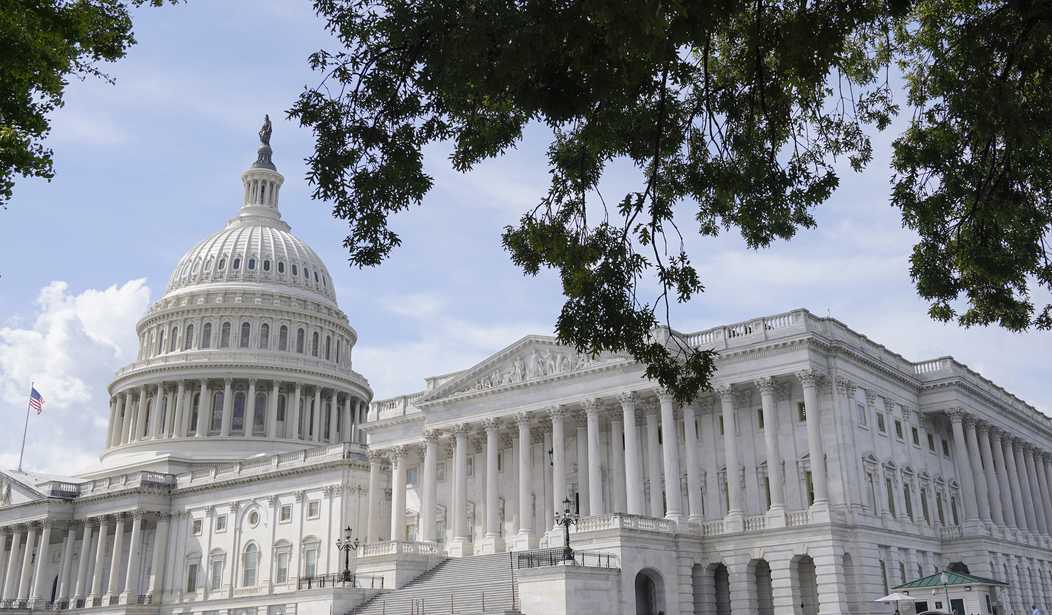You can't swing a dead cat in Washington without hitting a former member of Congress working as a lobbyist or a corporate consultant. So it’s not surprising to see former congressmen lend their names to opinion pieces advocating for or against legislation.
As a former Hill staffer engaged in policy advocacy after government service, I don’t begrudge former lawmakers taking public stances. However, when they lend their names to opinion pieces that simply regurgitate well-worn narratives, make specious arguments and use unsound reasoning, one may be forgiven for assuming it’s more about the paycheck than advancing something they know about or believe in.
A rash of cookie-cutter op-eds popping up around the country aims to undermine American patent rights on behalf of Big Tech interests. For about three decades, I’ve seen their efforts in courts, executive agencies and on Capitol Hill to erode the protections for intellectual property the Framers enshrined in the Constitution.
Sweetheart legislation and regulation, and decisions by courts, have been buoyed by a fictitious “patent troll” narrative. Big Tech’s mouthpieces have repeatedly deployed and—lamentably, to great effect—enabled a business strategy of “efficient infringement.” This strategy, first named in a 2015 op-ed, operates on the idea that it’s cheaper deliberately to infringe patented technology rather than pay inventors and patent owners licensing fees.
“Efficient infringers” routinely invoke the shopworn narrative of “patent trolls” harming innovation. With every legislative or administrative proposal to restore patent owners’ rights or reasonably to limit assaults on them, orchestrators of the false narrative mobilize op-eds decrying the end of American competitiveness.
Recommended
Likewise, when a Big-Tech-friendly bill is proposed, these same voices—often associated with industry associations or front groups created and funded by Big Tech—rise up to sing its praises and rail against patent trolls without the slightest admission that small inventors, research institutions and other nonpracticing entities (NPEs; patent owners who don’t manufacture their inventive products) are the ones their bill will harm.
What’s new over the past year, and particularly so over the last few months, is the surprising number of former members of Congress who have joined the chorus of voices singing from the antipatent hymnal. Granted, some were active on these issues while in Congress. Yet that experience and time for reflection on the consequences of their policies has failed to produce clarity of thought.
Former Sen. Patrick Leahy (D-Vt.), a champion of the disastrous America Invents Act of 2011 and no friend to the pro-patent community, wrote a piece decrying proposed rule changes at the U.S. Patent and Trademark Office (USPTO). Those changes would apply common-sense limits where virtually unlimited patent challenges now occur at an administrative tribunal. That tribunal, the Patent Trial and Appeal Board (PTAB), which the AIA created, has resulted in more than 80% of challenged patents being invalidated in whole or in part.
Sen. Leahy overlooks how unbalanced his "patent death squad” has become. He asserts that “patent trolls will be incentivized to target smaller, under-resourced business,” conjuring a scenario where patent owners put their own patents in jeopardy in an all-or-nothing gambit to foreclose future challenges. That patent owners, NPE or not, would line up to test this proposition strains credulity.
Also, former Rep. Bob Goodlatte (R-Va.), once chairman of the House Judiciary Committee and of the House Republican High-Technology Working Group, has continued advocating for weakening patents. Penning many op-eds this year, a recent one shared the byline with former Agriculture Committee colleague Collin Peterson (D-Minn.) – both now lobbyists.
They claim that litigants are stalking farmers with “baseless patent infringement accusations.” That’s a curious claim to make without offering evidence of an agricultural firm or a family farm involved in such a suit. The intent is clear: Incite fear in a community of farmers that they’ll be preyed on by “patent trolls.” All this in support of patent-weakening efforts that benefit Big Tech.
A newcomer to the patent issue, former GOP senator from Missouri Roy Blunt, embraced the patent troll trope in an opinion piece he signed. He claimed that allowing patent owners to petition the U.S. International Trade Commission (ITC) to stop imports of patent-infringing products would have “devastating consequences for telehealth access in rural communities.” You’d be forgiven for not understanding the connection.
The pretext of Sen. Blunt’s argument is a complex case where Apple was accused of stealing heart monitoring technology and building its devices overseas. The subtext is simple: Gut the ITC’s power and limit remedies for patent owners in order to remove impediments to Apple’s efficient infringement.
These and other ex-lawmakers—Sen. Scott Brown, Rep. Buck McKeon, Rep. Rick Boucher, Sen. Max Baucus, among others, Republicans and Democrats alike—suddenly, mysteriously sound off against “patent trolls.” Only the most incurious would fail to see the common thread unifying all these disparate voices mimicking the “patent troll apocalypse” narrative.
Let’s hope, for the sake of American innovation, that the U.S. patent system withstands the number of former lawmakers on Big Tech’s payroll.

























Join the conversation as a VIP Member